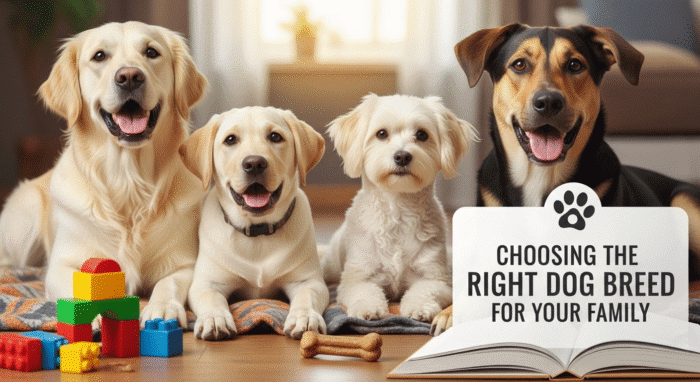Okay, let’s talk dogs. Not just any dogs, but the kind of dog that actually fits into your family like that missing puzzle piece you’ve been searching for. Because, let’s be honest, getting a dog is a huge decision! It’s not like picking out a new toaster (though even that can be surprisingly stressful, can’t it?). This is a living, breathing, shedding, and occasionally mischievous member you’re inviting into your life. Choosing the right dog breed is crucial, folks. Absolutely crucial.
I’ve seen families make the mistake of falling for the fluffiest puppy in the window without considering, you know, the actual breed characteristics. Cute is a factor, yes, but it’s far from the only factor. You might be wondering, “What other factors are there?” Well, sit tight; we’ll dive in.
Table of Contents
Lifestyle Compatibility: A Non-Negotiable

Think about your lifestyle. Really think about it. Are you a marathon runner who dreams of a furry companion for those early morning jogs? Or are you more of a ‘Netflix and chill’ kind of family, where the highlight of the day is a leisurely stroll to the park? (No judgment here; I’m a bit of both, depending on the day!).
This matters. A lot. Because a high-energy Border Collie is going to be absolutely miserable in a home where they’re stuck inside all day. And a lazy Bulldog might not be the best choice for someone who wants an adventure buddy for intense hikes. It sounds obvious, but trust me, it’s easy to get caught up in the cuteness and forget this crucial step. Actually, that’s not quite right – you also have to think about your living space. A Great Dane in a tiny apartment? Not ideal. (Though I did once know someone who had a Saint Bernard in a studio. The mind boggles.)
The frustrating thing about this topic is that there are SO many breeds to consider! Wikipedia lists hundreds. It can feel overwhelming. But start by being honest about how much time you can realistically dedicate to exercise, training, and grooming. And consider your tolerance for barking, shedding, and general dog-related chaos.
Temperament and Training: Shaping Your Furry Friend
Every dog is an individual, of course. But breeds are bred for certain temperaments. It’s in their DNA. Some breeds are naturally more eager to please and easy to train, like Golden Retrievers or Poodles. Others are a bit more independent and require a firm, consistent hand, like Huskies or Shiba Inus. (I’ve got to admit, the stubbornness of a Shiba Inu is both infuriating and endearing at the same time!).
Think about your experience with dog training. If you’re a first-time dog owner, you might want to choose a breed that’s known for being relatively easy to train. And be prepared to invest in training classes or online resources. It’s not just about teaching your dog to sit and stay; it’s about building a strong bond and establishing clear communication.
And training isn’t a one-time thing. It’s an ongoing process. You’ll need to reinforce good behavior and address any problem behaviors that arise. Here’s the thing: a well-trained dog is a happy dog. And a happy dog makes for a happy family. Think about it this way – a bit like investing in a good education for your kids, but with more tail wags and slobbery kisses.
Children and Dogs: A Delicate Balance
If you have children, choosing the right breed becomes even more critical. Some breeds are naturally more patient and tolerant of children than others. Golden Retrievers, Labrador Retrievers, and Beagles are often cited as good choices for families with kids. But even with these breeds, supervision is key. Kids need to learn how to interact with dogs respectfully, and dogs need to be taught how to tolerate the sometimes unpredictable behavior of children.
I remember when my cousin brought home a rambunctious terrier puppy when her kids were little. It was chaos! The puppy nipped, the kids pulled tails, and everyone was stressed. It eventually worked out, but only after a lot of training and careful supervision. The biggest thing to remember? A dog is never, ever a babysitter.
Don’t just assume that a dog will automatically love your kids. It takes time, patience, and consistent training to build a positive relationship. It’s worth the effort, though. There’s nothing quite like the bond between a child and their dog. Truly magical.
Health Considerations: Planning for the Future
Okay, let’s talk about something a little less fun: health. Certain breeds are predisposed to certain health problems. For example, German Shepherds are prone to hip dysplasia, and Bulldogs are prone to breathing problems. Do your research! Talk to breeders, veterinarians, and other dog owners to get a sense of the potential health challenges associated with different breeds.
And be prepared to pay for vet care. Dog ownership is not cheap! Vaccinations, checkups, medications, and potential emergency treatments can add up quickly. Consider pet insurance to help offset some of the costs. It’s better to be prepared than to be caught off guard by a large vet bill.
FAQ: Choosing the Right Dog Breed for Your Family
How do I know if a breed is right for my energy level?
This is a great question and one of the first things you should consider. Start by researching the typical energy levels of different breeds. Look for descriptions like “high-energy,” “moderate-energy,” or “low-energy.” Then, honestly assess your own lifestyle. Do you enjoy daily walks, runs, or hikes? Or are you more of a homebody? Be realistic! If you’re not prepared to provide a high-energy dog with enough exercise, choose a lower-energy breed. You can also look for breed-specific rescue organizations. These organizations know their breed well and can help match you with a dog that fits your lifestyle.
What’s the best way to introduce a new dog to my existing pets?
Introducing a new dog to existing pets requires patience and careful planning. Start by keeping the dogs separate for the first few days, allowing them to get used to each other’s scent through a closed door. Then, introduce them in a neutral territory, like a park, on leashes. Keep the interactions short and positive, and reward calm behavior. Never leave them unsupervised until you’re confident they’re getting along well.
My apartment has breed restrictions. How do I find a suitable dog?
Many apartments have breed restrictions, often targeting larger or “aggressive” breeds. Start by reviewing your apartment’s pet policy carefully. Then, focus your search on breeds that are allowed. Smaller breeds, like Bichons Frises or Cavalier King Charles Spaniels, are often good choices for apartments. But remember that size isn’t everything. Even small dogs need exercise and training. A well-exercised and well-trained smaller dog is almost always a better apartment companion than a bored and destructive larger dog.
How important is it to meet the parents of a puppy?
Meeting the parents of a puppy, especially the mother, can give you valuable insights into the puppy’s temperament and potential health issues. A friendly and well-adjusted mother is more likely to produce puppies with similar qualities. If the breeder doesn’t allow you to meet the parents, that’s a red flag. It could indicate that the dogs are being kept in poor conditions or that the breeder is hiding something. Reputable breeders will be proud to show you the parents and answer any questions you have.
Choosing the right dog breed for your family is a big decision, no doubt about it. But with careful research, honest self-assessment, and a whole lot of love, you can find the perfect furry companion to share your life with. And trust me, the rewards are immeasurable. Just be prepared for the shedding. Seriously, the shedding…
Oh, and one more thing. Don’t forget to check your local shelters and rescue organizations. You might just find your perfect match waiting for you there. Happy dog hunting! And if all else fails, get a cat. (Just kidding… mostly).
And hey, if you ever feel lost in the sea of dog breeds, remember you can always consult gaming guides that sometimes have dogs as companions or characters, for example, this Poki site.

